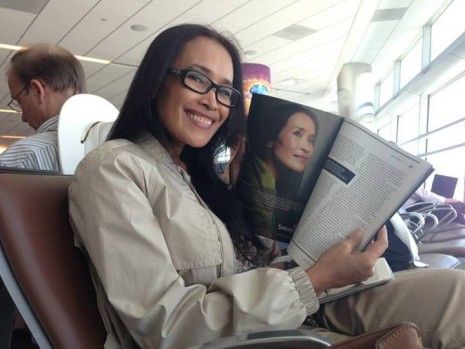Since its creation in 2007, the Somaly Mam Foundation (SMF) has attracted top U.S. business leaders and Hollywood stars to the worthy cause of combating the trafficking of children into Cambodia’s sex industry.
Growing out of Somaly Mam’s Phnom Penh-based organization Agir Pour Les Femmes en Situation Precaire (Afesip), which was launched in 1996 to care for child victims of the sex industry, SMF is the global fundraising arm of the Cambodian NGO.
SMF was created with the help of U.S. Air Force Academy graduates Jared Greenberg and Nicholas Lumpp as a way to raise funds for the work being carried out by Afesip and five other sex trafficking organizations. The SMF’s mission to raise funds for groups fighting against sex trafficking has been hugely successful.
At the annual SMF gala dinner, scheduled for October 23 in New York’s 1920s-era Gotham Hall ballroom, a donation of $100,000 was required to secure seating for 20 guests at two “gala chair” tables.
The fundraising prowess of the SMF is largely due to the foundation’s board of directors and global advisory board, which includes: Jennifer Fonstad, managing director of the multibillion dollar venture capital firm Draper Fisher Jurvetson; Brandee Barker, former head of global communications and public policy for Facebook; Sheryl Sandberg, Facebook’s COO; actresses Susan Sarandon, Daryl Hannah and Lorie Holden; supermodel Petra Nemcova; and Melanne Verveer, U.S. ambassador-at-large for global women’s issues.
Thanks to the foundation’s fundraising efforts, the SMF has grown considerably in recent years with spending increasing from $348,283 in 2008 to $3.53 million in 2011, according to financial reports filed with the U.S. Internal Revenue Service (IRS).
Revenues raised by the SMF between 2009 and 2010 increased 47 percent to $3.17 million. At the same time, the foundation’s expenses increased 100 percent from $1.52 million to $3.04 million, according to the IRS filings.
In 2011, revenues fell 40.8 percent to $1.88 million compared to 2010. Expenditures, however, rose that year to an all time high of $3.53 million. Among the SMF’s expenditures, which include salaries, travel and advertising, are funds transferred to actual projects for the purpose of ending slavery and sex trafficking in Cambodia, Laos and Vietnam.
In 2009, grants and additional assistance from the SMF to organizations outside the U.S. (in Cambodia and other Southeast Asian countries—the SMF now has links to projects in Laos and Vietnam) amounted to $835,480. In 2010, that amount was slightly less at $759,338. In 2011, the figure totaled $808,838, still less than in 2009. Figures for 2012 are not yet available. While grants and assistance to projects reduced between 2009 and 2011, travel expenses for the SMF between 2009 and 2010 increased threefold from $112,378 to $357,463, according to the IRS filings. Spending on advertising and promotion also increased from just $13,501 in 2009 to $221,887 in 2010 and $211,672 in 2011.
“Compensation” for the SMF’s current officers, directors, trustees and key employees also grew from $152,370 in 2009 to $324,461 in 2010. In 2011, that figure reached $492,755, an increase of 51.9 percent year-on-year. Another entry in the SMF’s IRS filings relates to “other salaries and wages,” which increased from $63,542 in 2009 to a sizable $378,384 in 2010 and a whopping $641,946 in 2011.
Breaking those categories down, the filings show that compensation to the organization’s top management has steadily increased: Ms. Mam, the foundation’s co-founder, who earned nothing from the foundation in 2008, earned $85,000 in 2009, $96,000 in 2010 and $125,642 in 2011.
Bill Livermore, SMF’s former CEO, who has now left the organization to set up another anti-trafficking organization, was paid $72,375 in 2009, $166,655 in 2010 and $149,580 in 2011. Helen Rosen, the foundations top financial officer, who has also since left the organization, earned $65,604 in 2010 and $78,645 in 2011.
Mr. Livermore and Ms. Rosen did not respond to requests for comment and Ms. Mam has declined interview requests since last year.
According to the SMF’s latest annual report from 2011, Afesip was caring for 358 victims inside three rehabilitation centers in Cambodia that year, 81 of whom were younger than 16.
According to the annual report, funding for Afesip’s programs in Cambodia increased to $559,822 in 2011 from $387,500 the previous year, when Afesip was supporting 339 victims, 79 of whom were younger than 16.
Afesip’s funds were spent on improvements “in the infrastructure and operations of rescue, rehabilitation and reintegration services,” according to the report.
A total of $85,499 was also given to Afesip’s branch in Laos and a further $30,640 was provided to Alliance Anti Trafic in Vietnam in 2011.




